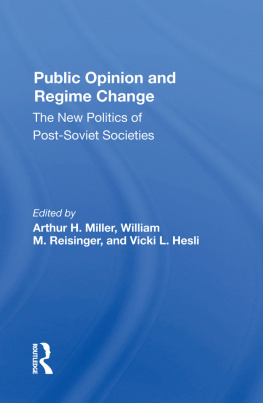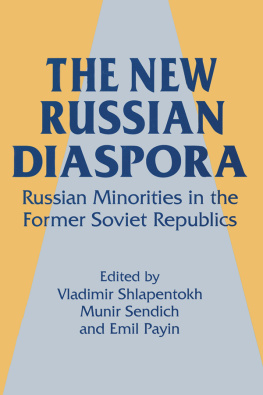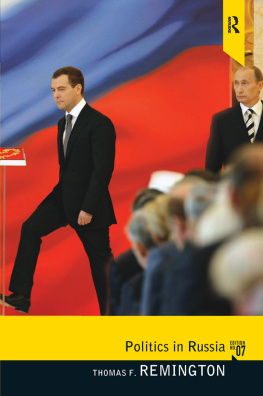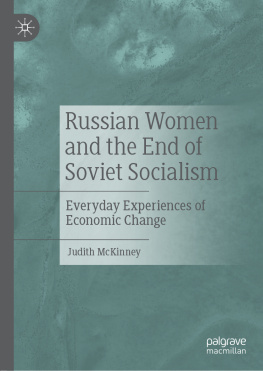Foreword
Do not delude yourself. Our market and the classes it generates la n guish in the shadow of a resource-based economy socially organized as a system of estates . In an extremely concise and simple way, S i mon Kordonsky's views can be reduced to the above assertion. I su s pect it is "simple" for me, because I have read his book Socio-Economic Foundations of the Russian Post-Soviet Regime . For the readers, I would like to highlight the key aspects of the work. Ho w ever, trying to convey Kordonsky's idea, I am constantly tempted to present my own views on the subject. Retelling any good book is a challenge, since it trains the mind rather than the memory.
The author distinguishes two analytical models the market and resource-based economy. Classes form the social foundation of the market, whereas the social structure of the resource-based economy is reduced to a hierarchy of social estates. The competitive creativity of the market economists call it competition generates new pro d ucts (resources). The successful get richer, the losers get poorer. This determines the division of people into classes distinguishable obviou s ly by their consumer behavior. The people themselves clearly and uniquely identify themselves in this space, since such classes are levels of a consumer hierarchy.
However, there is another algorithm to concentrate resources in a single center and distribute them to those who by deed or word have proved their usefulness to society, or in other words, to the state, which are fundamentally inseparable in this scenario. O. Bessonova calls such an economy distributive, since relations of "give-receive" rule the day rather than the simplified market motto of "buy-sell". Kordonsky defines such an economy as r e source-based, emphasizing the fundamental importance of dividing resources among the estates as the core process of social life.
The market economy is balanced through the pricing mechanism. The resource-based economy has other signal channels forcing the center to adjust the "distribution" mechanism. When in the process of distribution somebody's interests are ignored or somebody appropr i ates what he is not entitled to, complaints flow to the center, and the mechanism is adjusted using techniques specific for the period from cutting heads to criticizing at communist party meetings. When the tide of complaints ebbs, the "distributive" mechanism is considered to be "socially fair", which means that the majority of people agree that different activities receive resources commensurate with their contr i bution to the common cause of serving the state.
Service, not labor is compensated in an estate society. The diffe r ence i s fundamental. One can work a lot or not much, but one can serve only well or poorly. Ultimately, market behavior targets new consumption peaks, thus implying quantitative measures of labor and performance. Estate service transforms the notion of labor into pe r formance of duties imposed by the society. Therefore, the nature r a ther than the measure of labor is important, because the nature of service holds a code to the individual's social status, rights, duties, privileges, moral norms, and relations with law. Poor service is fraught with downgrading. This is likely to cause a decline in income not because there is less work in a lower position, but because the service is less responsible. Labor is paid, and service is rewarded. The r e warded are people who serve. They are divided into estates groups that have different responsibilities to the center (sovereign) with a respective differentiation in rewards and rights. Some serve the state "directly" (at present, these include prosecutors, judges, police offi c ers, the military, state civil servants, etc.) and are referred to as titular estates with numerous internal rankings. They have visual insignia (uniform), formal evidence of belonging to the services (official IDs), legislatively stipulated privileges (e.g., deputy immunity from prosec u tion), and informal regulators of estate behavior. Some serve "indirec t ly", providing conditions for the activity of the service estates (doctors, teachers, scientists, lawyers, the clergy, prostitutes, and others) these are the so-called non-titular estates , the second echelon of ser v ing people with an appropriate prestige and pay. A class hierarchy relates to the world of consumption, whereas an estate hierarchy to the space of rights and privileges.
Various activities, such as collecting and inventorying resources, ensuring their integrity, jailing or frightening those who attempt their unauthorized "carve-up", protecting from the enemy, and others, d e termine the diversity of the estates' functional designation. However, this visible distinction in the types of activity conceals a single driving force of every service to demonstrate exceptional usefulness for the general cause, irreplaceability, and, with luck, the ability to replace others, which eventually determines the amount of resources alloca t ed to an estate. Please note: not in proportion to the work, but accor d ing to the significance of the service. The activity of the estates is not focused on creating resources (what determines market activity ) . I n stead, it is focused on redistributing ("carving up", as the author of the book calls this process) the available resources and expanding the space of rights and privileges stipulated by law or tradition.
In the modern world, neither the market, nor the resource-based economy exist in pure form. They coexist . For several centuries, we have been looking up to countries with a sustainable balance between the market and "distribution", where market activities dominate. The estates remain, but belonging to them is more a question of prestige than income level. Due to the domination of market principles, classes triumph over estates. In particular, wealth is no longer linked to the estate status. An aristocrat may be poor. I n an estate-base d society, however, the hierarchy of estates influences the income of their me m bers. A high-ranking official cannot be poorer than members of lower-ranking estates. At least, that is what he believes. Similarly, a police officer is certain that enforcing law and order is more important than engaging in "buying-and-selling". Simply, he establishes this law and order for the benefit o f private clients rather than as a public benefit. However, since no one formally recognizes the triumph of service hierarchy as the core principle of social organization, servicemen are forced to "restore social justice" by all means, even risking to be pro s ecuted for various "abuses".
In Russia, the resource-based economy dominates, giving up its positions only when the existing resource distribution patterns collapse or the resources run out. However, as soon as market initiative starts bearing fruit in the form of an expanding resource base, the service estates reinstate their positions. P rinciples of the market and r e source-based economy coexist in diachrony, i.e., the periodic brief triumph of the market gives way to long-term concentrated "carve-up" of resources behind the facade of zealous service. "...This produces the phenomenon of cyclicity in Russian history a certain 'groundhog century'".
The social map of present-day Russia is extremely mixed: relict estates of bygone ages loudly claiming what they believe "they are entitled to"; newly established estates mobilized to fight the "threats of the XXI century", real or imaginary; and classes desperately trying to break free from the web of estate exactions. The latter find the m selves in a difficult position from every podium they hear assurances that "we are building the market", but actual experience and calcul a tions indicate some other reality. Governed by the simple principle to call a spade a spade, Kordonsky provides a name for this reality. E s tates engaged in "carving up" resources that is the e ssence of our social life. W hat we call politics out of habit, is the process of finding a compromise to align the interests of classes with the resource app e tites of the estates through mechanisms of political and economic lobbying.








